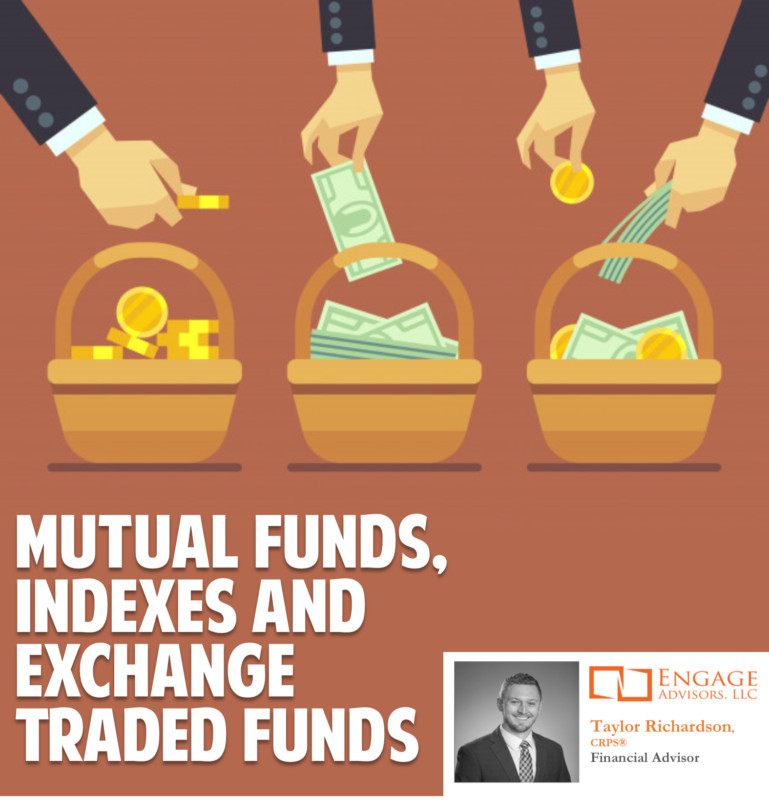Last week we discussed the definition of an investment, stocks and bonds. This week we discuss how those are turned into investment types.
Mutual Funds
Mutual Funds pool together dollars from individual investors or institutional investors. This pool of money is then used by a professional money manager and their team to invest in specific stocks and bonds. The money manager and his team must invest the money based on a specific investment perimeter that is known by the investors. Each investor owns a percentage of all the investments selected by the money manager and their team.
Why would we want this?
– Being that this is their full-time occupation, investment managers and their team can spend considerably more time then the average investor, investigating and analyzing and selecting certain investments.
– Diversification- Many times we cannot become diversified (owning many different stocks and bonds from different sectors, countries, industries, company sizes, etc..) by ourselves, but- when we pool our monies together we now have buying power and invest in a single mutual fund that is better diversified then one stock/bond.
-Fees for the money manager and their team are heavily regulated and known to the investor.
Con
-The money manager and his team could potentially have a bad year or be bad at their job. If the money manager and the team select investments that lose money, our investments will lose money. So, we must do our due diligence to make sure we are selecting good money managers and teams.
-Mutual funds do not trade (buy or sell) during the day. They only trade once the stock market has closed, so they can calculate the value of each share of the mutual fund.
-Can be inefficient with taxes and capital gains, Mutual Funds must pass on capital gains and other taxable income to the investor.
Exchange Traded Funds-ETF
We think of ETFs as baskets. These baskets hold investments or shares of investments. When we buy an ETF, we are buying part of the basket that holds the investments. These baskets are similar to mutual funds in that they hold investments for a similar investment perimeter and can be actively managed by a money manager or passive and follow indexes.
Why would we want to buy an ETF?
-Easy diversification, instead of buying individual investments, buying a basket that holds many investments allows us to diversify our investments.
-Intraday trading- ETF trade while the market is open, so we can move in and out of the ETF as long as there is a buyer or a seller on the opposite end of us.
-Tax efficient – ETFs do not pass on capital gain and other taxes to the investor.
Con
-Internal expenses are difficult to find out/know
-In order to buy an ETF, there must be a seller and vice versa. So, we can get stuck holding an investment we want to get rid of if there is not a buyer willing to take it off our hands.
Index
An index is a weighted average of a group of stocks that are picked to represent the remainder of a market. For example, the DOW Jones industrial, which is the oldest and most famous index, is a weighted average of the 30 largest stocks on the New York Stock Exchange and they use this to represent the rest of the stock market. You cannot invest directly into an index, but you can invest in Mutual Funds or ETF’s that mirror the index. Indexes are used to benchmark our investment returns.
If you have any questions about Mutual Funds, ETF’s, or Indexes give me a call at 913-681-9155 or email me at Taylor@engageadvisors.com.
Engage Advisors is a Registered Investment Adviser. This platform is solely for informational purposes. Advisory services are only offered to clients or prospective clients where Engage Advisors, LLC and its representatives are properly licensed or exempt from licensure. Past performance is no guarantee of future returns. Investing involves risk and possible loss of principal capital. No advice may be rendered by Engage Advisors, LLC unless a client service agreement is in place.

